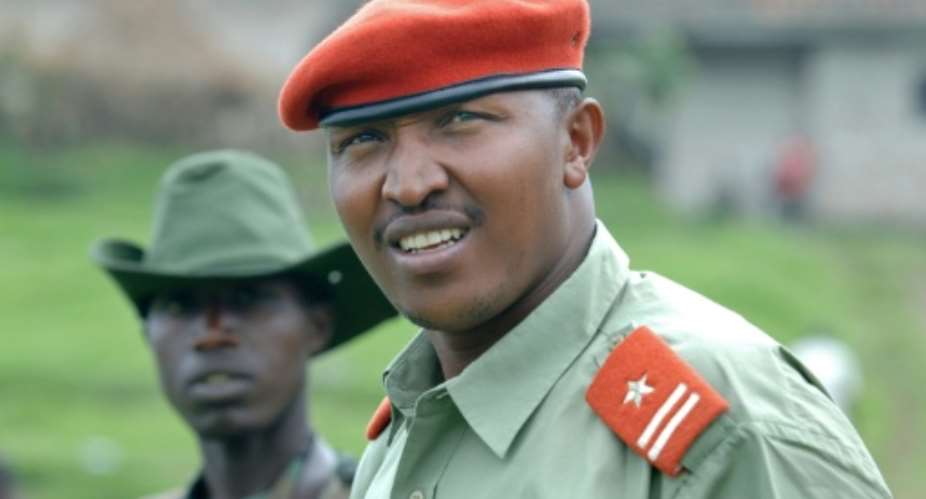The Hague (AFP) - Congolese warlord Bosco Ntaganda gave "orders to attack and kill" hundreds of victims in a decade-long campaign of terror in eastern Democratic Republic of Congo, the International Criminal Court heard Wednesday.
Nicknamed "The Terminator," Ntaganda denied 18 charges of war crimes and crimes against humanity as his highly-anticipated trial opened in The Hague.
Ntaganda, who surrendered to the US embassy in Kigali in 2013, stands accused of orchestrating hundreds of deaths in savage ethnic attacks in the DR Congo, as well as recruiting and raping child soldiers in his own rebel army.
"Bosco Ntaganda was one of the highest commanders... he gave the orders to attack and kill," ICC chief prosecutor Fatou Bensouda told a three-judge bench.
The "bloody" northeastern Congolese region of Ituri was decimated by violence perpetrated by Ntaganda's forces, she said, adding he left "hundreds dead and thousands living in the forest with nothing and a population terrorised".
"Bosco Ntaganda continued to terrorise the eastern Democratic Republic of Congo for a decade more" after the events from 2002-2003 with which he is charged, Bensouda added.
The 41-year-old, dressed in a black suit and oka white shirt with a grey-striped tie, sat listening intently with his hands folded in front of him as the charges were read out.
"Mr President, I plead not guilty to all the charges," he said in a soft voice, speaking in his native Kinyarwanda.
- Breaking his silence -
During an initial two-day session, Bensouda is to present the prosecution's opening arguments first, after which the victims' lawyers and the defence will address the court.
Ntaganda is also due to make a statement -- breaking his silence for the first time publicly since he unexpectedly turned himself in two years ago.
Eastern DR Congo has been mired for two decades in ethnically-charged wars, as rebels battle for control of its rich mineral resources.
Despite protesting his innocence, prosecutors say the feared rebel commander played a central role in the Ituri conflict which rights groups believe alone left some 60,000 dead since 1999.
Ntaganda "recruited hundreds of children... and used them to kill and to die in the fighting," Bensouda told reporters on Tuesday ahead of the trial opening.
Girl soldiers were "routinely raped," the prosecutor added.
Prosecutors have collected 8,000 pages of evidence from more than 2,000 victims, and plan to call some 80 witnesses -- 13 of them experts and the rest victims.
Three former child soldiers in Ntaganda's rebel Patriotic Forces for the Liberation of Congo (FPLC) will also take the stand, their lawyers said.
Ntaganda, 41, was one of the most-wanted fugitives in Africa's Great Lakes region until he unexpectedly surrendered in March 2013 and asked to be sent to The Hague.
He was the founder of the M23 rebel group defeated by the Congolese government in late 2013 after an 18-month insurgency in the vast Democratic Republic of Congo's North Kivu region.
Observers say Ntaganda most likely feared for his life as a fugitive from a rival faction within M23, but his motives for surrendering to the ICC remain unclear.
Also nicknamed "The Terminator" and known for his pencil moustaches, cowboy hats and love of fine dining, Ntaganda faces 13 counts of war crimes and five of crimes against humanity.
The court had issued two arrest warrants against Ntaganda -- the first in 2006 and the second with additional charges in 2012.
His former FPLC commander Thomas Lubanga was sentenced to 14 years in jail in 2012 on charges of using child soldiers, one of only two convictions handed down by the court since it was set up 12 years ago.
Born in 1973, Ntaganda is among a dozen Africans in the custody of the ICC, a court criticised for apparently only targeting leaders from the continent. His trial is set to be complex and last several months.





 We’ll protect state wealth from opaque deals – Prof Jane Naana
We’ll protect state wealth from opaque deals – Prof Jane Naana
 Mauritania president says running for second term in June polls
Mauritania president says running for second term in June polls
 I won't ever say I was a mere driver’s mate' — Prof. Opoku-Agyemang
I won't ever say I was a mere driver’s mate' — Prof. Opoku-Agyemang
 2024 polls: 'EC struggling to defend credibility'— Prof. Opoku-Agyemang
2024 polls: 'EC struggling to defend credibility'— Prof. Opoku-Agyemang
 Akufo-Addo gov't's 'greed, unbridled arrogance, unrestrained impunity, sheer dis...
Akufo-Addo gov't's 'greed, unbridled arrogance, unrestrained impunity, sheer dis...
 Election 2024: Ghana needs an urgent reset, a leadership that is inspiring – Ma...
Election 2024: Ghana needs an urgent reset, a leadership that is inspiring – Ma...
 Partner NDC to rollout a future of limitless prospects – Prof Jane Naana Opoku-A...
Partner NDC to rollout a future of limitless prospects – Prof Jane Naana Opoku-A...
 NPP will remain in gov’t till Jesus comes — Diana Asamoah
NPP will remain in gov’t till Jesus comes — Diana Asamoah
 Sunyani Technical University demands apology from former SRC president over sex-...
Sunyani Technical University demands apology from former SRC president over sex-...
 'Dumsor' was resolved by Mahama but ‘incompetent' Akufo-Addo has destroyed the g...
'Dumsor' was resolved by Mahama but ‘incompetent' Akufo-Addo has destroyed the g...
